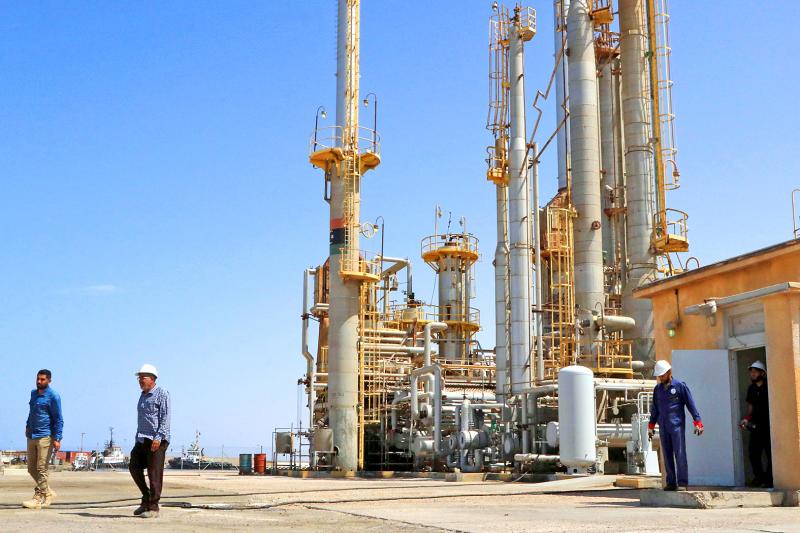Oil on Friday retreated as a further increase in Libyan output threatens to return more supply to a market that is already grappling with a slump in demand caused by the COVID-19 pandemic.
West Texas Intermediate for December delivery slid 1.94 percent to settle at US$39.78 a barrel. It was down 2.69 percent for the week, as a resurgence of COVID-19 infections spurred governments around the world to renew tighter lockdown restrictions.
Brent crude for December delivery fell 1.63 percent to US$41.77 a barrel, losing 2.7 percent from a week earlier.

Photo: AFP
Libya lifted force majeure on its Ras Lanuf and Es Sider ports, and oil output is set to surpass 1 million barrels a day in four weeks, state-run National Oil Corp said.
The announcement came as prospects for more Libyan output increased following the signing of a permanent ceasefire agreement.
Prices were already on the decline as talks appeared to stall on a US stimulus deal before the election, with US House of Representatives Speaker Nancy Pelosi and US Secretary of the Treasury Steven Mnuchin trading blame for the impasse.
A deal would have injected a sorely needed boost to demand, with positive catalysts for prices harder to come by heading into the end of the year.
“The apparent nationwide ceasefire in Libya is only going to encourage more production there and keep it steady, at least for a while,” said John Kilduff, a partner at Again Capital LLC.
Meanwhile, “the COVID situation is not really improving, if not getting worse. So we’re continuing to deal with that as well,” Kilduff said.
While comments from Russian President Vladimir Putin signaling openness to delaying a planned OPEC+ output hike helped bolster prices, the continued return of Libyan production complicates the group’s tapering strategy.
“Until we get a vaccine, prices are probably going to hang out around this range,” said Jay Hatfield, chief executive officer of Infrastructure Capital Advisors LLC in New York. “We need airline travel, and we’re not going to have airline travel until we have a vaccine.”
Despite the prospect of more Libyan supply returning to the market, Brent’s structure remained firm.
The spread between the global benchmark’s nearest contracts strengthened on Friday to its narrowest contango since late July.
Meanwhile, traders’ attention is shifting toward the outcome of the US election in November, which could have varying implications for US supply.
Former US vice president Joe Biden, the Democratic presidential candidate, said that fossil fuels need to be phased out over time, a comment seized on by US President Donald Trump as a threat to the industry.
However, there is debate over how much such a policy would affect oil prices in the near future.
“The transition would take many years and require ample use of fossil fuels in the process,” TD Securities commodity strategists including Bart Melek said in a note. “It is not worrisome for oil markets in the near-term.”
Additional reporting by staff writer.

DOLLAR CHALLENGE: BRICS countries’ growing share of global GDP threatens the US dollar’s dominance, which some member states seek to displace for world trade US president-elect Donald Trump on Saturday threatened 100 percent tariffs against a bloc of nine nations if they act to undermine the US dollar. His threat was directed at countries in the so-called BRICS alliance, which consists of Brazil, Russia, India, China, South Africa, Egypt, Ethiopia, Iran and the United Arab Emirates. Turkey, Azerbaijan and Malaysia have applied to become members and several other countries have expressed interest in joining. While the US dollar is by far the most-used currency in global business and has survived past challenges to its preeminence, members of the alliance and other developing nations say they are fed

LIMITED MEASURES: The proposed restrictions on Chinese chip exports are weaker than previously considered, following lobbying by major US firms, sources said US President Joe Biden’s administration is weighing additional curbs on sales of semiconductor equipment and artificial intelligence (AI) memory chips to China that would escalate the US crackdown on Beijing’s tech ambitions, but stop short of some stricter measures previously considered, said sources familiar with the matter. The restrictions could be unveiled as soon as next week, said the sources, who emphasized that the timing and contours of the rules have changed several times, and that nothing is final until they are published. The measures follow months of deliberations by US officials, negotiations with allies in Japan and the Netherlands, and

Foxconn Technology Group (富士康科技集團) yesterday said it expects any impact of new tariffs from US president-elect Donald Trump to hit the company less than its rivals, citing its global manufacturing footprint. Young Liu (劉揚偉), chairman of the contract manufacturer and key Apple Inc supplier, told reporters after a forum in Taipei that it saw the primary impact of any fresh tariffs falling on its clients because its business model is based on contract manufacturing. “Clients may decide to shift production locations, but looking at Foxconn’s global footprint, we are ahead. As a result, the impact on us is likely smaller compared to

TECH COMPETITION: The US restricted sales of two dozen types of manufacturing equipment and three software tools, and blacklisted 140 more Chinese entities US President Joe Biden’s administration unveiled new restrictions on China’s access to vital components for chips and artificial intelligence (AI), escalating a campaign to contain Beijing’s technological ambitions. The US Department of Commerce slapped additional curbs on the sale of high-bandwidth memory (HBM) and chipmaking gear, including that produced by US firms at foreign facilities. It also blacklisted 140 more Chinese entities that it accused of acting on Beijing’s behalf, although it did not name them in an initial statement. Full details on the new sanctions and Entity List additions were to be published later yesterday, a US official said. The US “will